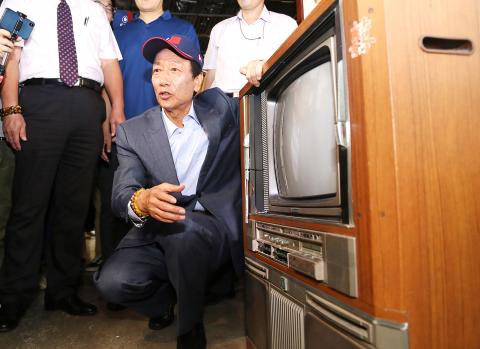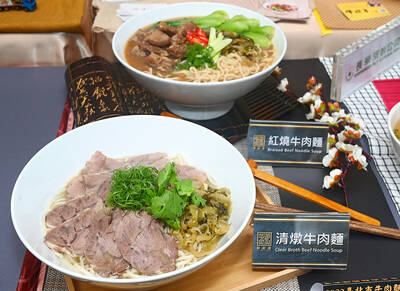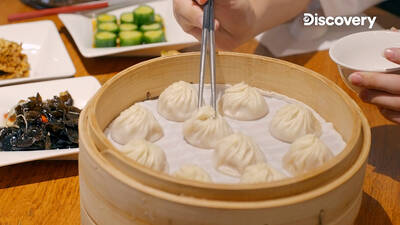Hon Hai Precision Industry chairman Terry Gou has thrown his hat into the ring to contest the Chinese Nationalist Party (KMT) presidential primary. The business tycoon once remarked that “Democracy doesn’t put food on the table,” which was criticized at the time by President Tsai Ing-wen and triggered a war of words among netizens. Without getting bogged down in the finer details of the correlation between democracy and economic growth, is it true — as Gou asserts — that the public are struggling to make ends meet to the extent they don’t have enough to eat? In reality, nothing could be further from the truth.
In the past few years, Taiwan’s economy has been relatively stable and has not experienced boom or bust. This is borne out by the economic data. Between 2016 and 2018 , Taiwan’s GDP grew by an orderly 1.51, 3.08 and 2.63 percent per year. Per capita GDP for last year was US$24,971, ranked 35th in the world, higher than China or India, but lagging behind Japan, South Korea, Singapore and Hong Kong.
However, if per capital GDP is calculated using purchasing power parity, which takes into account cost of living and inflation, Taiwan moves up to 19th place, overtaking both Japan and South Korea.

Photo: CNA
照片:中央社
In other words, while Taiwan’s economy is not going gangbusters or charging forward like a hot knife slicing through butter, neither is it in recession, nor is the general public destitute and struggling to feed itself, as Gou has intimated. However, with a presidential election looming in January, some are seeking to manufacture a brouhaha over the economy and are singling it out for attack.
Will Gou’s brand of populist rhetoric have the desired effect? To some extent it will have an impact: while the domestic economy continues to grow, real salaries are not increasing. Meanwhile, food and beverage costs are going up every year. If the electorate is left with the general impression that they are being sucked dry, this could easily morph into a wider feeling of discontentment onto which may be projected a sensation of not having eaten one’s fill.
Central to modern democratic government is the concept of one-person-one-vote, with each vote being of equal value. Democracy is a way of life and a specific ordering of political power, rather than an ideology in and of itself. If, as Gou says, “Democracy doesn’t put food on the table,” does this mean that if we dispense with democracy we can all be rich? The answer should be self evident.
(Translated by Edward Jones, Taipei Times)
鴻海精密執行長郭台銘要出馬角逐國民黨總統初選,他過去「民主不能當飯吃」的言論,引起總統蔡英文的反擊與網路多方論戰。姑且不論民主與經濟發展的距離為何,但把台灣當前經濟情況說到民不聊生、連飯都吃不飽的地步,這就與事實相差太遠。
坦白說,台灣這幾年經濟表現尚屬平穩,並沒有大起大落,根據統計,二○一六至二○一八年國內生產毛額成長率依序為百分之一點五一、百分之三點○八及二點六三。若以人均國內生產毛額成長率來看,去年為兩萬四千九百七十一美元,在全球排名三十五,高於中國、印度等國,但落後日、韓、星、港。
不過,若以生活費用及通膨的「購買力平價」算出的人均國內生產毛額成長率,台灣一舉拉高到全球第十九名,超越日本及南韓。
也就是說,台灣目前景氣雖然不是一飛沖天、勢如破竹,但絕對沒有落到經濟衰退、民不聊生的貧困局面,與吃不飽的說法還相差太遠;不過,就因為明年一月要總統大選,經濟情況就被拿來大做文章與攻擊。
這種庶民語言有沒有效果呢?其實,多多少少會有,國內經濟雖然持續成長,但民眾實質薪資不漲,荷包沒增加,民生餐飲費用卻年年提高,這種相對剝奪感,很容易轉化為不滿情緒及吃不飽的心理投射。
所謂的民主政治,就是一人一票、票票等值,這是一種生活方式與政治權力運作結構,絕非一種意識形態;試問,若民主不能當飯吃,難道沒有民主就可以發大財嗎?答案已經不言而喻。
(自由時報記者王孟倫)
讀後練習
Follow up
Questions (True or false)
1. It has been decided that Hon Hai Precision Industry chairman Terry Gou will be the Chinese Nationalist Party’s (KMT) candidate at next year’s presidential election.
2. Depending on how GDP per capita is calculated, between 2016-2018 Taiwan’s economy outperformed China, India, Japan and South Korea.
3. The author believes politicians are correct to focus on poor economic performance prior to the coming presidential election.
4. The author disagrees with Gou’s statement that democracy doesn’t fill stomachs.
(Edward Jones, Taipei Times)

US President Donald Trump has renewed his ambition to take control of Greenland for national security reasons and questioned whether Denmark has any legal right to the Arctic island. The debate has revived scrutiny of how Greenland became part of Denmark, its current self-rule and path to independence, and Washington’s military footprint. HOW DID DENMARK GET GREENLAND? Greenland was inhabited by Inuit peoples from Asia and North America intermittently from around 2,500 BC. Around 985 AD, Vikings led by Erik the Red settled in southern Greenland, farming and building churches. Around the same time, ancestors of today’s Inuit arrived, living as hunters

A: In its latest annual travel guide, Bloomberg recommended two restaurants in Taipei: Golden Pig barbeque from South Korea and two-Michelin-star restaurant A. B: Also, tourists should definitely try Taiwanese cuisine while they’re here. Mountain & Sea House, Shin Yeh Taiwanese Cuisine, and Fujin Tree Taiwanese Cuisine & Champagne are good options. A: For local snacks, Fu Hang Soy Milk, Fu-Ba-Wang Pigs’ Knuckles Restaurant, and Wang Ji Rice Dumplings are all very popular. B: And the gold medalists of the 2025 Taipei International Beef Noodle Festival — Yun Shui Kitchen, The Howard Plaza Hotel Taipei, and Come N’ Eat

A: Bloomberg just released its annual travel guide, titled “25 Best Places to Travel in 2026.” What were the best Asian destinations? B: There were actually six Asian hotspots: Taiwan’s Taipei, Malaysia’s Penang, Kazakhstan’s Almaty, Indonesia’s Rote Island, India’s Tiger Reserves, and Oman. A: With its mix of traditional food and modern cuisine, Taipei has become a rising food capital in Asia. B: As Bloomberg reported, “Taiwan is a place that bubbles up in culinary conversation because of its famed beverage, bubble tea, and its early adoption of modern night markets.” A: And Din Tai Fung has now

Facing relentless flooding and rising expenses, Dumble Farm in England has stopped selling milk and started an unexpected but therapeutic venture: cow cuddles. In 2022, the owners sold most of their dairy cows and began letting visitors spend time brushing, petting, and even hugging specially trained Highland cows for 95 pounds per session. This unusual shift reflects the rise of the so-called healing economy, a sector where animal-assisted experiences are marketed as emotional remedies for stress and burnout. While dogs and cats remain the most common therapy animals, cows are gaining popularity for their calm nature. At Dumble Farm, only cows that